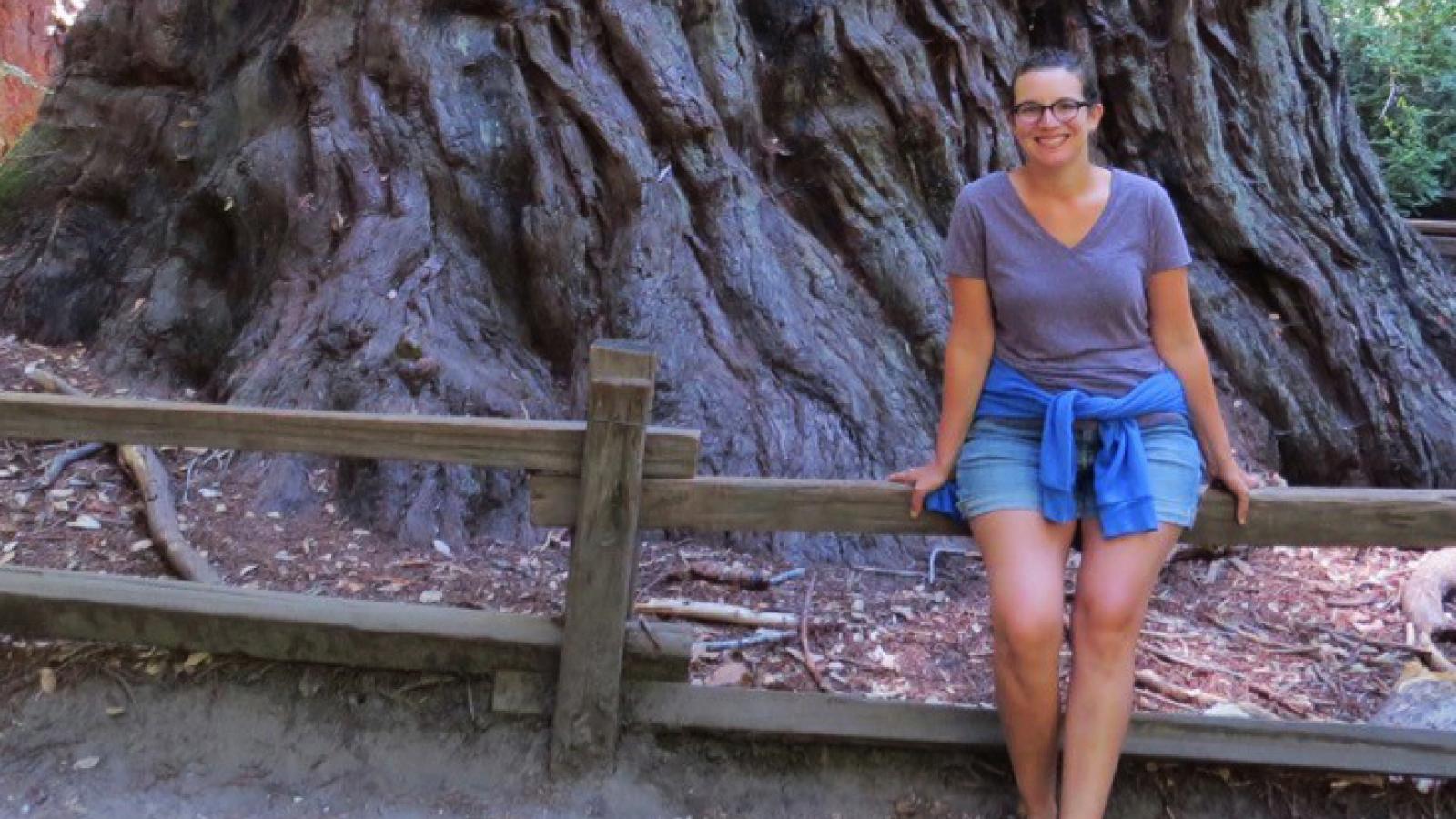Katie D'Amico-Willman
Katie received her B.S. in biology with a minor in computer science from John Carroll University. She earned an M.S. in conservation biology from the SUNY College of Environmental Science and Forestry where her research focus was on the potential non-target impacts of a transgenic American chestnut with enhanced blight resistance. After completing her Masters, Katie worked for the USDA Agricultural Research Service at Cornell University in a Pseudomonas systems biology lab where her research focus was on small RNAs and their impacts on pathogen virulence in both tomato and Arabiodopsis models.
As a PhD candidate in the TPS-GP, Katie works in the lab of Dr. Jonathan Fresnedo Ramirez in the Department of Horitculture and Crop Science. Her dissertation research goal is to better understand plant aging and its effects in perennial species. To accomplish this, she is using non-infectious bud-failure in almond (Prunus dulcis), hypothesized to be an age-related disorder, as a model system. Her research aims to identify epigenetic mechanisms associated with exhibition of bud-failure in different cultivars and clones of almond. Approaches include comparing telomere length, examining gene expression patterns and performing epi-genotyping-by-sequencing using important almond cultivars and clones exhibiting distinct degrees of bud-failure. This work will help us to better understand the deterioration of key biological processes that occurs as plants age, particularly in perennial species.
Email: damico.115@osu.edu
Education
BS, Biology, John Carroll University, 2008
MS, Conservation Biology, SUNY College of Environmental Science and Forestry, 2012
Long Term Career Interests
Forest Pathology
Transcriptomics and Metabolomics
Regulation of Tree Defense
Science Policy
Current Status in TPS
Post-candidacy
Faculty Mentor: Dr. Jonathan Fresnedo Ramirez
Co-Mentor: Dr. Andy Michel
First Year Rotations
1. Enrico Bonello
2. Joshua Blakeslee
Grants & Awards
2020 University of Washington Summer Institute in Statistical Genetics Scholarship
2019 HCS Graduate Research Symposium Poster Competition, Second Place
2019 CFAES Research Conference Doctoral Poster Competition, Second Place
2019 ASPB Midwest Graduate Student Oral Presentation Competition, First Place
2018 ASPB Midwest Section Travel Grant
2018 Council of Graduate Students Ray Travel Award for Service and Scholarship
2018 SEEDS: OARDC Research Enhancement Competitive Grants Program recipient
2017 Alumni Grant for Graduate Research and Scholarship
2017 Sigma Xi Scientific Research Honor Society Inductee, Associate Member
2016 Honorable Mention; National Science Foundation Graduate Resarch Fellowship
2016 Sigma Xi Grant-in-Aid of Research recipient
Internship
Adjunct faculty, College of Wooster, Department of Biology
Publications
D'Amico-Willman, K.M., Anderson, E.S., Gradziel, T.M. and Fresnedo-Ramirez, J. (2021). Relative telomere length and telomerase reverse transcriptase (TERT) expression are assocaited with age in almond (Prunus dulcis [Mill.] D.A. Webb). Plants, 10(2), 189.
Conrad, A.O., McPherson, B.A., Lopez-Nicora, H.D., D'Amico, K.M., Wood, D.L, and Bonello, P. (2018). Disease incidence and spatial distribution of host resistance in a coast live oak/sudden oak death pathosystem. Forest Ecology and Management 433, 618-624.
D’Amico, K., and Filiatrault, M. (2017). The conserved hypothetical protein PSPTO_3957 is essential for virulence in the plant pathogen Pseudomonas syringae pv. tomato DC3000. FEMS Microbiology Letters 364.
Butcher, B. G., D’Amico, K., Chakravarthy, S., Coster, M., and Filiatrault, M. (2017). Virulence of Pseudomonas syringae is modulated through the catabolite repression control protein Crc. Molecular Plant-Microbe Interactions 30, 283-294.
Butcher, B., Chakravarthy, S., D’Amico, K., Stoos, K.B., and Filiatrault, M. (2016). Disruption of the carA gene in Pseudomonas syringae results in reduced fitness and alters motility. BMC Microbiology 12, 194-209.
D’Amico, K.M., Horton, T.R., Maynard, C.A., Stehman, S.V., Oakes, A.D. and Powell, W.A. (2015). Assessing Ectomycorrhizal Associations on Transgenic American Chestnut Compared to the Wild Type, a Conventionally-Bred Hybrid, and Related Fagaceae Species. Applied and Environmental Microbiology 81, 100-108.
Park, S.H., Bao, Z., Butcher, B.G., D’Amico, K., Xu, Y., Stodghill, P., Schneider, D.J., Cartinhour, S., and Filiatrault, M.J. (2014). Analysis of the small RNA spf in the plant pathogen Pseudomonas syringae pv. tomato strain DC3000. Microbiology 160 941-953.
Park, S.H., Butcher, B.G., Anderson, Z., Pellegrini, N., Bao, Z., D’Amico, K., and Filiatrault, M.J. (2013). Analysis of the small RNA P16/RgsA in the plant pathogen Pseudomonas syringae pv. tomato strain DC3000. Microbiology 159, 296-306.
D’Amico, K.M. (2012). Assessing Ectomycorrhizal Associations on Chestnut: Comparing Transgenic, Wild-type, a Conventionally-bred Hybrid and Related Fagaceae Species. Masters Thesis. SUNY College of Environmental Science and Forestry.

